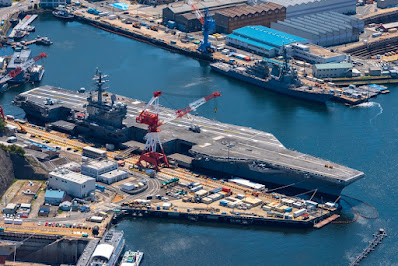In the last issue of The Journal, I offered a look back at the multimillion-dollar bribery and fraud case that occurred in the late 1980s at the Defense Personnel Support Center in Philadelphia, known locally as the “Quartermaster.”
Defense contractors who manufactured Navy peacoats and other military clothing bribed Department of Defense civilian employees to ensure the companies received major clothing contracts and expedited processing that led to the contractors receiving enormous government checks. The federal investigation was called “Operation Thimble.”
At the time, I was a young Defense Department civilian employee doing security work at the Quartermaster, so I knew and worked with some of the people that were caught up in the scandal.
For the Journal piece, I interviewed Joesph L. Ford, the former lead FBI investigator and Linda Dale Hoffa, the assistant U.S. attorney who prosecuted case. Both Ford and Hoffa have long since retired from federal service.
A year after Operation Thimble, an even bigger bribery case rocked the Defense Department and the Navy. The investigation was called “IllWind.”
According to the FBI, some Defense Department employees had taken bribes from businesses in exchange for inside information on procurement bids that helped some of the nation’s largest military contractors win lucrative weapons systems deals.
More than 60 contractors, consultants, and government officials were ultimately prosecuted—including a high-ranking Pentagon assistant secretary and a deputy assistant secretary of the Navy. As a monetary measure of the significance of the crimes, the case resulted in a total of $622 million worth of fines, recoveries, restitutions, and forfeitures.
The Navy was again rocked more recently with another massive bribery case. I covered the “Fat Leonard” case in the Journal in 2017.
In 2015, Leonard Glenn Francis, a 350-pound Malaysian known as Fat Leonard, pled guilty to bribery and fraud charges and admitted to presiding over a decade-long conspiracy involving what the Justice Department called “scores of U.S. Navy officials, tens of millions of dollars in fraud and millions of dollars in bribes and gifts – from cash, prostitutes and luxury travel to Cuban cigars, Kobe beef and Spanish suckling pigs.”
The Navy officers and others provided Francis with information about the upcoming port visits of naval ships, which is classified, as well as confidential contracting information and information about law enforcement investigations of Leonard’s company.
More than 27 active duty and retired Navy officers, civilian officials and others pled guilty when faced with the overwhelming evidence from the investigation. More indictments are forthcoming.
So even while the Fat Leonard investigation is ongoing, the Navy is facing yet another bribery scandal.
On October 18th, the Justice Department announced that Frank S. Rafaraci, the CEO of Multinational Logistics Services (MLS), a large ship husbanding company that has received over $1 billion in U.S. Navy contracts since 2010, appeared in federal court to face a criminal charge for his alleged participation in a bribery scheme.
“According to the affidavit in support of a criminal complaint filed in September, Frank S. Rafaraci, 68, a U.S. citizen who resides abroad, has been the CEO of MLS since at least 2005,” the Justice Department stated. “MLS is a defense contractor that provides ship husbanding services, such as refueling and stocking provisions, to U.S. Navy ships at ports worldwide. From approximately 2010 to the present, the U.S. Navy, other U.S. Department of Defense (DoD) components, and U.S. government civilian agencies awarded husbanding services contracts to MLS worth approximately $1.3 billion.”
The affidavit alleges that, beginning in 2011, Rafaraci was involved in a wide-ranging scheme to bribe U.S. Navy officials, defraud the U.S. Navy using falsely inflated invoices, and launder the proceeds of the scheme through shell companies Rafaraci had set up in the United Arab Emirates, all in an effort to benefit MLS.
“Frank Rafaraci allegedly defrauded the Navy, bribed a Navy official, and laundered money through foreign bank accounts for years,” said Assistant Attorney General Kenneth A. Polite Jr. of the Justice Department’s Criminal Division. “The Criminal Division remains committed to combating fraud and corruption in defense contracting around the world.
Eric Maddox, the Special Agent in Charge of the Naval Criminal Investigative Service (NCIS) Economic Crimes Field Office, added, “Rafaraci’s alleged long-running criminal scheme to defraud the Federal government through bribery, falsified invoices, and money laundering cheated the U.S. taxpayer and wasted tremendously valuable resources. NCIS and our law enforcement partners remain steadfast in our commitment to root out bribery and corruption that threaten to diminish the operational readiness and warfighter superiority of the Navy and Marine Corps.”
As Linda Dale Hoffa, the Quartermaster prosecutor, told me, “Defense Department corruption can permeate an entire system and put at risk the lives of military personnel. Corruption costs taxpayers. It costs everybody.”
Paul Davis is a longtime contributor to the Journal of
Counterterrrorism & Homeland Security Int’l.
You can also read my Counterterrorism magazine pieces on
the Quartermaster and Fat Leonard Navy bribery and fraud cases via the below
links:




No comments:
Post a Comment